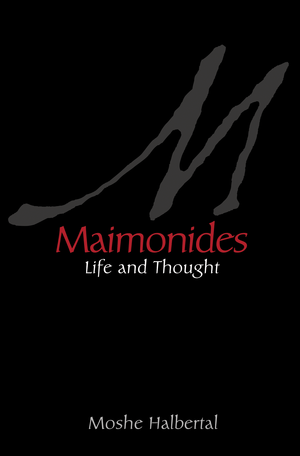Politics shouldn't determine what counts as art, but the energy released and channeled by art has a profound effect on politics, for good or ill.
Jewish Learning, Human Liberty
Mounted above the gallery doors of the House Chamber on Capitol Hill are 23 marble bas relief plaques of figures selected on account of their contributions towards establishing the principles underlying American law. Arranged in two groups of 11 on either side of chamber, these figures face a full-faced portrait of Moses situated in the center.
In several cases, such as the figures of Thomas Jefferson and William Blackstone, the connection with American legal principles is fairly obvious. The personages whose association is less obvious include the medieval Cordovan rabbi and philosopher, Moses Maimonides. His thought and writing are barely studied today outside of rabbinic seminaries. Hopefully, however, his intellectual stock is set to rise with the publication of this immensely accomplished and highly readable new book by Moshe Halbertal, Gruss Professor of Law at New York University and a professor of Jewish thought and philosophy at the Hebrew University in Jerusalem.
Maimonides’ seminal importance was amply recognized by the Liberty Fund’s founder, Pierre Goodrich, who included him among the 92 individuals named on the walls of the Goodrich Seminar Room at Wabash College, Indiana, for being the most important contributors to the understanding of liberty and responsibility.
Maimonides’ importance is further attested by the inclusion of his most philosophical work, Guide of the Perplexed, in the Liberty Fund’s Online Library of Liberty.
If Moses Maimonides is underappreciated today as a source of American legal principles, the same, of course, is true of his much better-known Biblical namesake. There was a time in America when the pivotal, but indirect, role played by Mosaic law in the construction of its Constitution was far better appreciated. In 1853, for example, the Presbyterian minister and one-time president of the City University of St. Louis, E.C. Wines, could observe in his Commentaries on the Laws of the Ancient Hebrews:
That government is instituted for . . . the happiness of the people and not the advantage of princes and nobles; that the people, either directly or by representatives, should have a voice in the enactment of the laws; that the powers of the several departments of government should be cautiously balanced; that the laws should be equal in their operation . . . that the life, liberty, and property of no citizen could be infringed, but by process of law . . . that judicial proceedings should be public, and conducted in accordance with established rules; that every man who obeys the laws, has a right to their protection; that education, embracing a knowledge of the laws, the obligations of citizenship, and the duties of morality, should be universal . . . –these great and vital principles of civil liberty were as fully embodied in the Hebrew constitution, as they are in the freest constitution now existing among men . . .
It is not in Greece that liberty was cradled . . . rather in that admirable frame of government given by the oracle of Jehovah . . . that we find the type and model of our own constitution. Even the Declaration of American Independence . . . was but an echo from the deep thunders of Mount Sinai.
Should the likes of E.C. Wines be correct about the ultimately Hebraic provenance of the ideals enshrined in the American Constitution, then a compelling case can be made for the centrality of Maimonides. No one ever better expounded Jewish law or argued for its eternal validity and universal relevance. Moreover, he did so without positing any supernatural acts of divine intervention in the course of nature to account for Jewish law’s supposed “revelation” to Moses, such breaks in the natural course of events having become, since the times of Spinoza and Hume, increasingly hard for moderns to swallow.
To show how and why Maimonides explained and defended Mosaic law without reference to supernatural acts of divine revelation is the central aim and accomplishment of Halbertal’s book. Since throughout his life Maimonides resided in societies in which any open disavowal of the miraculous would have been considered a heinous offence, by his coreligionists and by the presiding Muslim authorities alike, he was careful to conceal his project from all but those for whom it was undertaken. These were fellow well-educated Jews who, having been exposed to philosophy and science, found themselves unable to reconcile the conception of the world to which their secular studies had led them with the religion of their fathers and forefathers.
It was not only for their sakes that Maimonides sought reconciliation of their religion with the teachings of philosophy and science. Part of his motive was his wish to convey to as many coreligionists as possible the central teachings of philosophy and science as he understood them. This was so that they might acquire more elevated and spiritualized forms of their religion, which he considered better suited, not only to them personally, but to the facts. To accomplish this latter objective, Maimonides reorganized and restated Jewish law to show that, at its core, stood injunctions demanding the formation of the same beliefs about and attitudes towards God that he believed were the invariable products of exposure to philosophy and science, rightly approached and taught.
Maimonides undertook his first objective, for the most part, by showing how all the assertions in Hebrew Scripture seemingly at variance with philosophy and science—such as, for example, those ascribing corporeality to God—admitted of non-literal, figurative interpretations by which they became reconcilable with these disciplines. It was also accomplished, in part, by Maimonides cunningly, because allusively, demonstrating how such a wise and astute political leader as Moses would have been both willing and able to conceive of and promulgate the entire corpus of law, as a way to create, under the barbaric circumstances prevailing at the time, a well-ordered, humane, God-fearing polity.
Maimonides accomplished his second objective by producing a new, comprehensive codification of Jewish law that gave pride of place to several injunctions demanding correct beliefs about God and for which some philosophy and science was needed, supplied by Maimonides in codifying them.
In the opening paragraphs of his book, Halbertal summarizes these two principal objectives of Maimonides as follows:
Maimonides attempted to bring about two far-reaching and profound transformations in the Jewish world. The first pertained to the halakhah (Jewish law, broadly construed) which he sought to change . . . from a fragmented and complex system to one that was transparent and unambiguous . . . In his great code Mishneh Torah . . . Maimonides created an unambiguous, comprehensive, and exhaustive halakhic text . . . never . . . written before Maimonides’ time and [that] has not been written since.
The second transformation that Maimonides sought was a substantive shift in Jewish religious consciousness . . . First . . . [he] gave new meaning to the biblical struggle against idolatry . . . [which he] extends to a confrontation with the internalised image of God envisioned . . . as a merciful grandfather seated on a throne. [S]econd . . . was the placement of the natural causal order at the center of the divine revelation and presence . . . . . . [ a] fundamental change in religious sensibility away from miracle towards causality . . . . . . Third… [he] end[ed] the distinction between what was within the tradition and what was outside of it. In all his writings, halakhic as well as philosophical, Maimonides saw philosophy and science as the medium for attaining the heights of religious experience—love and awe of God . . . . . .Through philosophy and science a person can reach the pinnacle of religious life and realise his perfection as a human being.
What enabled Maimonides to effect the three transformations that he sought to effect in the religious sensibility of Jews was his maintaining—whether sincerely, or merely to accomplish them, remains unclear—that all the Biblical prophets, and above all Moses, possessed much the same philosophical and scientific wisdom as the Greeks acquired only centuries later. Thus, in the seventh of his so-called Eight Chapters in his comparatively early Commentary on the Mishnah, Maimonides remarks:
Know that no prophet prophesies until after he acquires all the rational virtues and most of the moral virtues . . . Thus, whoever has two or three [less than virtuous] moral habits . . . is said to see God from behind two or three veils . . . [In the case of] our master Moses . . . no veils remained which he had not pierced and . . . all the rational virtues had become perfected in him.
Maimonides was by no means the first or the last to claim that Moses possessed the very same kind of philosophical wisdom as the Greeks later attained. A classic example of a writer before him who did was the 1st century Alexandrian Jewish philosopher, Philo. A writer later than Maimonides who did, and who indeed imputed to the wisdom of the Greeks a Mosaic provenance, was the 17th century English philologist, Theophilus Gale. In his book Court of the Gentiles, Gale observes of Moses that:
Amongst all the Divine Philosophers, there was none that opened a more effectual door, for the propagating of philosophic principles and light than Moses; who by his writings contained in his five Books laid down the main foundations of all that Philosophie which first the Phoenicians and Egyptians, and from them the Grecians, were the masters.
In terms of its contemporary cultural import, it is somewhat beside the point how much historical truth there is in the notion, shared by Maimonides and Gale, that Moses had anticipated the ancient Greeks in the attainment of philosophical wisdom. What matters, or at least should do, is how sublime and still serviceable is the version of religion that results from incorporating Greek philosophy into it as Maimonides succeeded in doing in the case of Judaism.
By meticulously reconstructing the precise manner in which Maimonides effected that incorporation, Moshe Halbertal has performed an invaluable service for all who value religion, as well as the not-unconnected principles underlying American law.


